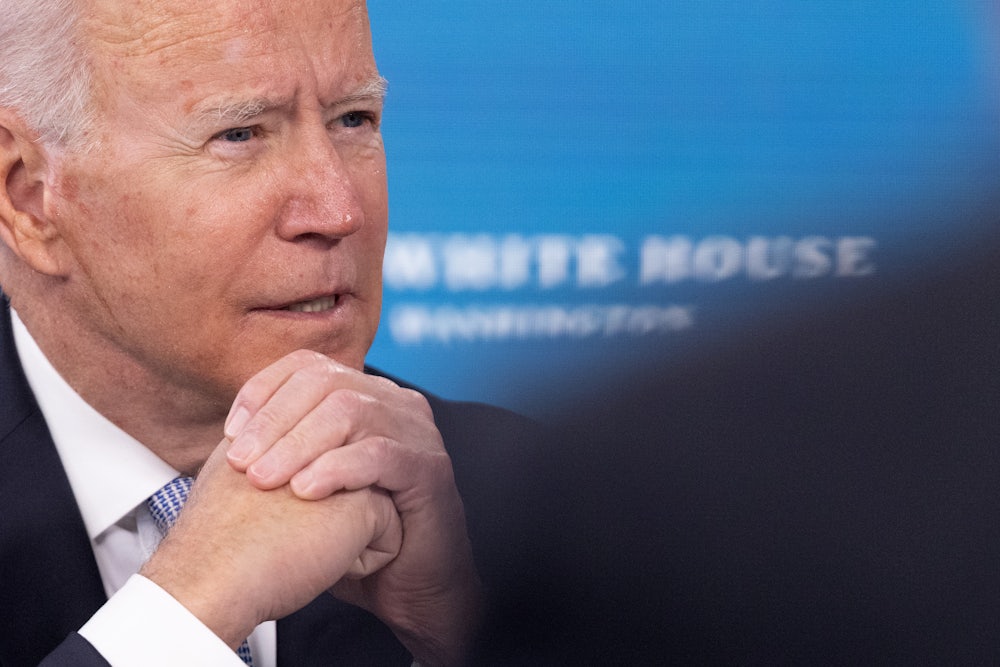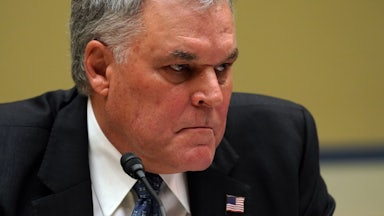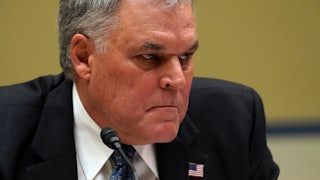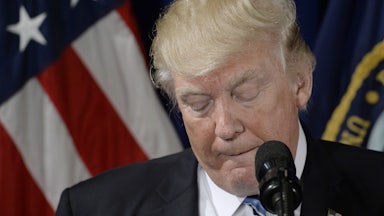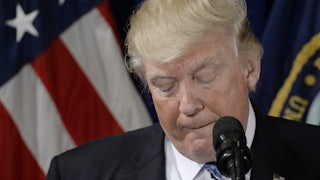Last month, ProPublica published a jaw-dropping look into the IRS data of well-known billionaires, revealing their meager effective tax rates in detail. The disclosures were met with shock and anger. After all, how could Jeff Bezos, Elon Musk, Michael Bloomberg, and George Soros go years without paying federal income taxes? And how could this possibly be legal? The article, the first in a series from ProPublica, renewed public cries that billionaires should, in fact, pay their fair share.
Instead of responding to the public momentum for comprehensive tax reform, some of the most important voices in the Biden administration promised to launch an investigation into ProPublica’s sources while expressing no anger at what they brought to light. Attorney General Merrick Garland, days after the story was published, called finding the source of the leak a “top of [his list]” priority. IRS Commissioner Charles Rettig (a Trump holdover who inexplicably remains in office more than five months into Biden’s term) immediately launched an investigation to find the leaker without indicating any plan to address his agency’s abject failure to tax the ultrarich.
As disappointing as the Biden administration’s response has been, it falls in line with the executive branch’s long-standing tendency to villainize whistleblowers and leakers in order to deflect from government wrongdoing revealed by these actors. Official whistleblower channels are deeply flawed: As early as 1992, the U.S. Merit Systems Protection Board found that approximately one-third of government employees who disclosed wrongdoing felt that they had received threats or retaliation. Even after the 2012 Whistleblower Protection Act, which many advocates view as woefully inadequate, whistleblowers faced internal retaliation, dismissal, and even prosecution.
The recent case of Treasury official Natalie Mayflower Edwards Sour demonstrates the onerous lengths whistleblowers need to go to be heard and the risks they face for speaking out. While at the Treasury’s financial crimes division, Edwards believed Treasury officials had illegally collected and stored data on American citizens, and attempted to raise alarms through the official whistleblower channels. When the information she brought to the department was not acted upon, she leaked suspicious activity reports, or SARs, to Buzzfeed News and the International Consortium of Investigative Journalists, revealing global failures to police money laundering that implicated Wall Street giants, including JPMorgan Chase, HSBC, Deutsche Bank, and Bank of New York Mellon. As a result, governments across the world held hearings and proposed reforms to a clearly broken system, and the FinCEN Files investigation was nominated for a Pulitzer Prize.
The Treasury responded by cracking down on the source of the information. In June 2021, Edwards was sentenced to six months in prison for “violating her oath.” Calls for Biden to pardon Edwards seem unlikely to be heeded; her story will be used as a warning tale to further silence civil servants looking to stop government wrongdoing.
During Biden’s last term in the executive branch, the Obama administration used the Espionage Act in unprecedented ways to silence whistleblowers and leakers; eight of the 13 people tried under the law since its enactment in 1917 were tried during Obama’s tenure. President Obama stoked fears about leaking to silence prominent whistleblowers, including Chelsea Manning and Edward Snowden, who revealed a variety of unethical and criminal practices during the Iraq and Afghanistan wars, as well as deeply invasive and unconstitutional National Security Administration policies. By framing the information about the NSA’s illegal spying as one of national security, the administration labeled Snowden a threat and mostly ignored the enormity of the illegal mass surveillance on which he shed light. In 2013, The New York Times Editorial Board, not exactly the harshest Obama critics, published an editorial condemning Obama’s over-prosecution of government whistleblowers and leakers, saying the administration had “gone overboard in its zeal to find and muzzle insiders.”
Predictably, the Trump administration drastically escalated the crackdown on whistleblowers and leakers, referring a record number of classified leaks for criminal investigation and equating whistleblowers with traitors in inflammatory and damaging language. Trump also politicized leaking and whistleblowing investigations to an unprecedented degree, targeting Democratic lawmakers and their families in leak investigations pertaining to the Russia investigation and his own impeachment.
Biden now has a golden opportunity to reverse this trend, and some of his early actions inspire hope. In November 2020, Biden named whistleblower Rick Bright to the coronavirus task force, and in May 2021, Biden proposed a steep increase in the budget for whistleblower protections at the Occupational Safety and Health Administration, from $18.6 million to $25 million. However, a close look at his executive branch personnel suggests that major obstacles to tackling the lack of whistleblower protections will remain. The Biden administration is currently stacked with individuals who helped weaponize whistleblower concerns and silence dissent during the Obama years.
Biden’s pick for the Treasury Department’s general counsel, Neil MacBride, cracked down on whistleblowers as the U.S. attorney for the Eastern District of Virginia. MacBride personally led the investigations into Manning and Snowden, as well as the criminal charges against Snowden. He also subpoenaed then–New York Times journalist James Risen, arguing that Risen did not have the right to claim First Amendment protection when he refused to disclose his source inside the government. MacBride’s potential position at Treasury is especially worrisome in light of the IRS and FinCEN whistleblowers; if confirmed, he will help shape not only the Treasury’s response to those disclosures, but the Department’s relevant priorities moving forward.
At the Justice Department, where leaks are referred to for criminal investigation, Deputy Attorney General Lisa Monaco holds an enormous amount of power, with all 93 U.S. attorneys reporting to her and responsibilities as the attorney general’s second in command. In 2015, Monaco led the White House’s public response to calls for Obama to pardon Snowden. Monaco, in a statement, called Snowden “dangerous” and warned of “severe consequences” to his disclosures. In a letter signed by over 40 groups, including Human Rights Watch, the ACLU, Government Accountability Project, and Equal Justice Alliance, advocates argued that Monaco’s statement “grossly misleads the American public” about Snowden’s actions, noting that there were no constructive channels for Snowden to challenge the NSA’s actions, and he did not have adequate protections against retaliation.
Monaco’s Department of Justice is currently facing a major test of its commitment to protecting free press and ending the dangerous policies of Donald Trump (some of which are direct legacies of President Obama). In the past two months, the Justice Department disclosed that during the Trump administration, it aggressively targeted journalists to investigate leaks, secretly seizing the phone records of four New York Times reporters and several from The Washington Post in 2017, and requesting more than 30,000 email records from a CNN reporter. In response to these revelations, Biden called the practice of seizing journalists’ phone records “simply wrong” and said under his leadership, he would “absolutely” prevent the Justice Department from continuing the practice.
However, Biden’s off-the-cuff remark does not mark a policy shift at the DOJ. At a White House briefing the same day, Press Secretary Jen Psaki failed to denounce the practice, and Attorney General Merrick Garland, while promising to curtail the DOJ’s efforts against whistleblowers, made the blatant caveat that the DOJ would still pursue journalists breaking the law in stories about leaked documents “unrelated to the leaking.” By making this distinction, Garland is giving himself public permission to do everything he can to protect Trump-era whistleblowers, while ensuring Biden-era whistleblowers are still treated as criminals and traitors who belong behind bars. Formal guidance, and official commitments, are necessary to restore public trust in the Department of Justice’s impartiality and commitment to protecting the rights of American citizens.
Protecting whistleblowers is an absolutely necessary step to fulfilling the Biden campaign’s repeated promise to restore “faith in American government.” Biden should increase whistleblower protections, codify his campaign promises to government employees, and ensure that his administration prioritizes good policy and transparency over its own power. His biggest obstacle may be the very people he’s tapped for his administration, people who earned Beltway accolades for gagging whistleblowers and creating a chilling effect that might dissuade public servants from reporting corruption and wrongdoing. Only by reversing the decades-long trend toward prosecuting and silencing government whistleblowers can Biden truly create a stronger and more transparent executive branch.
